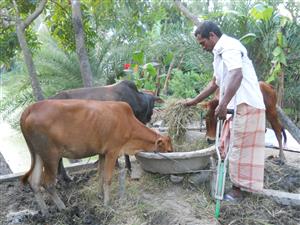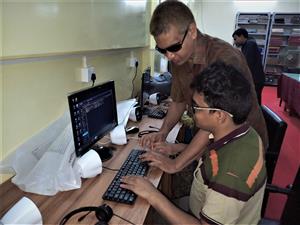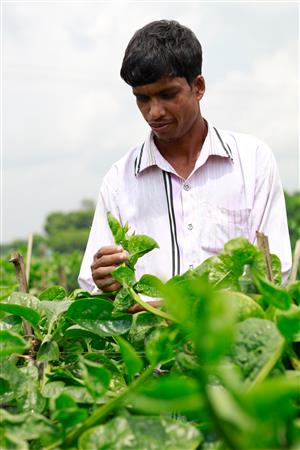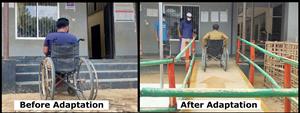Search Results
Search
Filter results
Advanced Filters
Your search returned 19 Solutions
-

Initiating microfinancing and micro-enterprises for a whole city sub-district
In 2015, YPSA surveyed 1,250 persons with disabilities in Sitakund and organized them into 50 self-help groups. Based on their socio-economic background and personal interest, 250 persons were selected to receive interest-free loans, vocational training as well as support to establish their own businesses.
YPSA - Young Power in Social Action, Sitakund sub-district of Chittagong, Bangladesh -
A holistic approach towards Inclusive Education in Bangladesh
LCD initiated the project in Nilphamari, one of the poorest districts in the northern zone of Bangladesh. Rather than focusing on just one area of education, this project employed a holistic approach that addressed a variety of the main barriers for children with disabilities to enrol in and attend school, and aimed to ensure a sustainable impact.
Leonard Cheshire Disability, Bangladesh -
Disability-inclusive approach to bring families out of extreme poverty
Since 2018 the project supports households in the cities of Kurigram and Chattogram. Participants receive rehabilitation services, including occupational therapy and counselling, and receive cash transfers to meet their basic needs. As of 2020, 1,447 households are being supported.
Humanity & Inclusion France, Disability Inclusive Poverty Graduation, Bangladesh -
Accessible learning materials for students with visual impairments
Young Power in Social Action is an organization employing nearly 2,000 people and 32 persons with disabilities (2016). In this specific project, 80% were persons with disabilities. It was to produce and distribute digital multimedia books, fully accessible e-books, and digital Braille books. By 2016 155 schoolbooks had been converted.
YPSA - Young Power in Social Action, Bangladesh -

University-based accessible e-learning centre for
students with disabilities
The Inclusive University Initiative of the NGO YPSA is an e-learning centre that provides accessible learning materials and volunteer support for students with visual impairments at the University of Chittagong in Bangladesh. Launched in 2019, there were five projects at other universities in 2021 and a plan for an online self-study portal.
YPSA - Young Power in Social Action, Inclusive University: An accessible e-resource centre in the University of Chittagong, Bangladesh -

Promoting self-employment in agriculture and aquaculture by training and microfinance
DRRA’s ‘Jibika’ project supports people with disabilities in the rural districts of Sathkhira and Jhenaidah to run their own vegetable or crab farming businesses by providing training and microfinance. Between 2017 and mid-2020, 514 people with disabilities were involved in running their own businesses.
DRRA - Disabled Rehabilitation and Research Association, JIBIKA, Bangladesh -
Toolkit and training to make health facilities in low-income countries more accessible
The "Accessibility Standards and Audit Pack" was launched by the international NGO Sightsavers to assess the accessibility of health care facilities and to implement structural measures. The toolkit is freely available online, and is currently used in Bangladesh and several countries in Subsaharan Africa.
Sightsavers, Accessibility Standards and Audit Pack, Bangladesh -
Holistic support system from early childhood to vocational training
"Learn for life" provides a range of support mechanisms for children with disabilities at all stages of schooling, from early childhood intervention to vocational training. Local disabled person’s organizations assume leadership of the programme and continue the work after its support is phased out.
DRRA - Disabled Rehabilitation and Research Association, Learn for Life, Bangladesh -
Providing accessible books and learning materials to blind students
The project uses globally accepted standards and open source technology to convert books into audio formats, while also partnering with other organizations to make existing audiobooks available. Students can access either e-books or audio versions of books, making it a cost-effective solution for accessing educational reading material.
YPSA - Young Power in Social Action, Audiobook Programme, Bangladesh -

Comprehensive accessibility programme for large refugee camps
Inclusive Rohingya Response was launched by the Centre for Disability in Development, a leading NGO in Bangladesh. It identifies inaccessible facilities in refugee camps of the Rohingya people and modifies them with locally available materials, provides training for staff members and health and rehabilitation services for people with disabilities.
CDD - Centre for Disability and Development, Inclusive Rohingya Response, Bangladesh